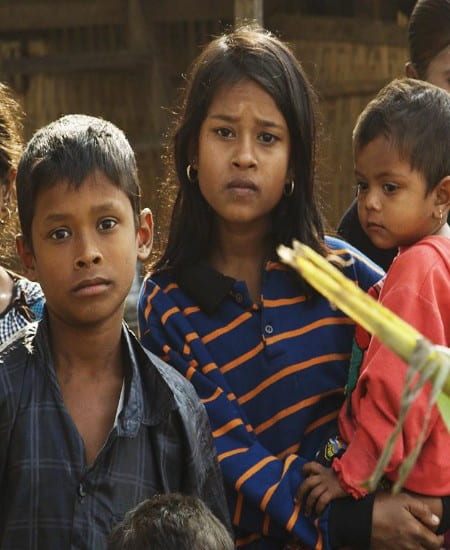Audio Recording Part 1
Audio Recording Part 2
Audio Recording Part 3
Tuesday, March 27, 2018
2:00 PM – 4:00 PM
The George Washington University
Elliott School of International Affairs
1957 E Street NW
Lindner Family Commons, Room 602
Washington, DC 20052
Gallery 102 is proud to present “As The World Watches.” This exhibition presents a select collection of responses to the humanitarian crisis affecting communities in Myanmar (formerly Burma). Like many other countries in our modern era, Myanmar is experiencing an increasingly fractured society and a growing radical movement within their politics. In keeping with some of history’s worst examples of conflict, the rapidly escalating violence in Myanmar is centered around religious and ethnic divisions. Recent riots have caused massive upheaval in the country, bringing long past due attention to the host of human rights issues affecting the Rohingya people. In the wake of this flood, the world has begun to turn its focus on the true cost and scope of a modern genocide. The aim of As The World Watches is to raise awareness of Myanmar’s long history of displaced peoples, and examine how the concept of “Other” has led to the systematic and ongoing annihilation of entire communities. Change can only begin with knowledge.
As part of this series, Gallery 102 and the Sigur Center for Asian Studies will present a film screening of “Left for Dead: Myanmar’s Muslim Minority.” The film shows what VICE News uncovered about its investigation into the violence and discrimination faced by the country’s Muslim minority. Following the screening will be a panel discussion on the film and the broader social, political, and historical context of the situation.
Discussants:
Layla Saad, Gallery 102 Curator & Co-Chair
Dr. Christina Fink, Professor of Practice of International Affairs, GW
Matthew Wells, Senior Crisis Advisor, Amnesty International
Robert Marro, Burma Task Force
About the film:
In recent years, democratic reforms have swept through Myanmar, a country that for decades was ruled by a military junta. As the reforms took hold, however, things were growing progressively worse for the Rohingya, a heavily persecuted ethnic Muslim minority concentrated in the country’s western state of Rakhine.
The 2012 gang rape and murder of a Buddhist woman by three Muslim men ignited violent riots in which hundreds were killed as Rakhine Buddhists and Rohingya attacked each other. In the following months, tens of thousands of Rohingya were rounded up and forced to live in squalid camps; Human Rights Watch deemed the attacks crimes against humanity that amounted to ethnic cleansing of the Rohingya. Thousands of Rohingya have since attempted to leave the country, fueling the region’s intricate and brutal human trafficking network.


